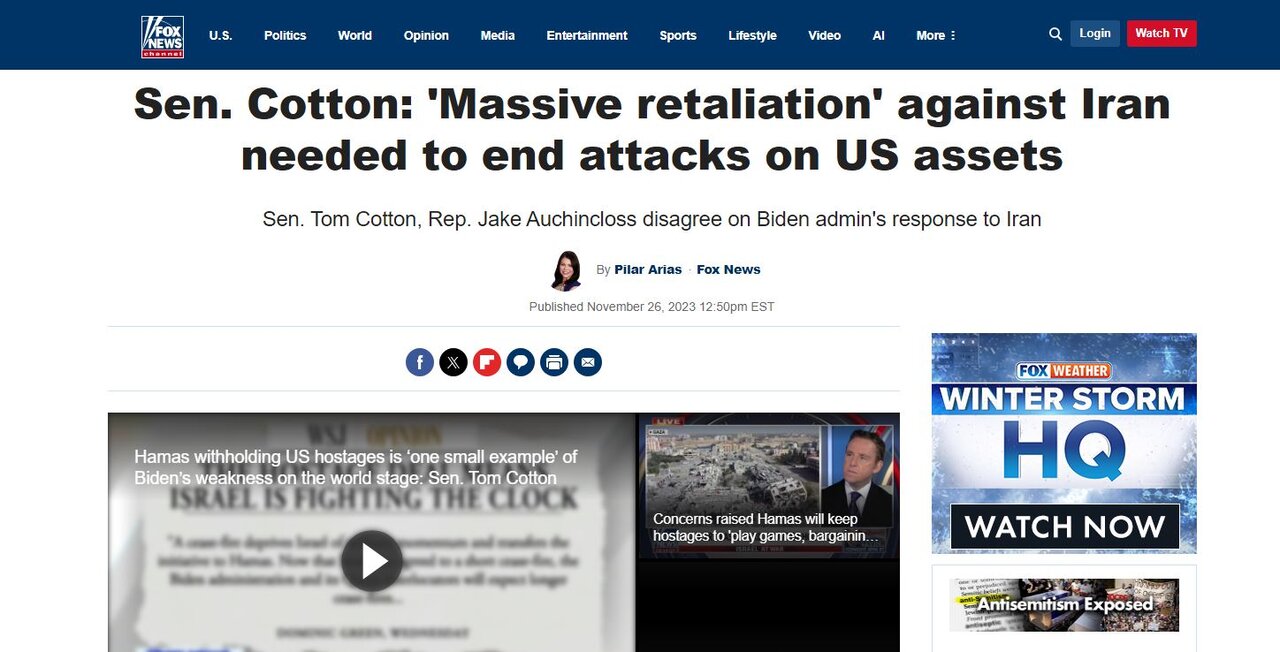Military attack, Washington’s ineffective foreign policy tool

TEHRAN- While the American hawkish senator Tom Cotton has urged ‘massive retaliation against Iran,’ Warmongering has never ensured Washington’s foreign policy interests.
Fox News has recently published a report on November 26 to shed light on Senator Cotton’s suggestions for the Biden administration to be “tougher on Iran.”
The former military officer, Cotton, enlisted in the U.S. Army on January 11, 2005, and was commissioned as a second lieutenant in June. In May 2006, he was deployed to Baghdad and led a 41-man air assault infantry platoon and from October 2008 to July 2009. He also was deployed to eastern Afghanistan.
The hawkish politician, with his military background, said that Biden’s “tougher” stance on Iran along with “massive retaliation” would end attacks on U.S. assets.
Cotton, who was characterized as a Trump loyalist during Donald Trump’s presidency, has brought his military views to his political career which is fueling Washington’s war policy.
Cotton was one of 18 Republican senators to vote for the $1.7 trillion omnibus bill which earmarked $45 billion more for Ukraine.
In continuation of his radical foreign policy views, Cotton voted in favor of imposing sanctions on Iran in July 2017.
In the wake of Trump’s announcement about the withdrawal of American troops from Syria in December 2018, Cotton called the move a “costly mistake,” which would embolden Iran and Russia.
Following the retaliatory Operation Al-Aqsa Storm carried out on October 7, 2023, Cotton voiced his support for Tel Aviv and denied that the Israeli regime was committing “war crimes” in the Gaza Strip.
Considering the political views of Cotton, he truly deserves to be labeled as the American version of Ben-Gvir, since he barely loses a chance of spreading warmongering ideas.
He calls for radical stances as if the U.S. national interests lie in warmongering policy. Yet, such a policy would lead to nothing but further hatred toward America in the world.
Attacks on U.S. bases stemmed from Washington’s West Asia policy
United States foreign policy in West Asia has its roots in the early 19th-century Tripolitan War that occurred shortly after the 1776 establishment of the United States as an independent sovereign state but became much more expansive in the aftermath of World War II.
With the goal of preventing the Soviet Union from gaining influence in the region during the Cold War, America prioritized support for Israel in its foreign policy agenda.
Also, the U.S. became the main patron for Saudi Arabia as well as other Arab states of the Persian Gulf in the 1960s and 1970s to ensure a stable flow of oil from the Persian Gulf.
U.S. interferences in West Asia have boiled the blood of the nations in the region to the point that they no longer tolerate the intervention of third parties, namely the U.S.
Therefore, the U.S. military bases, which have come under attack recently, are paying the price of their government’s West Asia policy.
Meanwhile, attributing the attacks to Iran is in fact shifting the blame in a bid to downplay Washington’s failed policies in West Asia and portray Iran as the root cause of the attacks on U.S. bases.
U.S. presidents know there is no room for Military action against Iran
The United States Intelligence Community (IC) is a group of separate intelligence agencies that report directly to the President of the United States. So Biden and his predecessors, aided with loads of information by the IC, were well aware that military action against Iran was not possible.
In case the military action had been a possible measure toward Iran, the U.S. presidents, for sure, would have given it a shot or at least they would have accompanied Israeli leaders to achieve their long-lasting dream.
U.S. presidents are well aware that Iran is waiting for just one wrong move.
In the end, it should be said that Washington should put an end to its warmongering. Given the experience of Vietnam, Iraq, and Ukraine now, it is time for Washington to leave its endless wars and look for peace.
